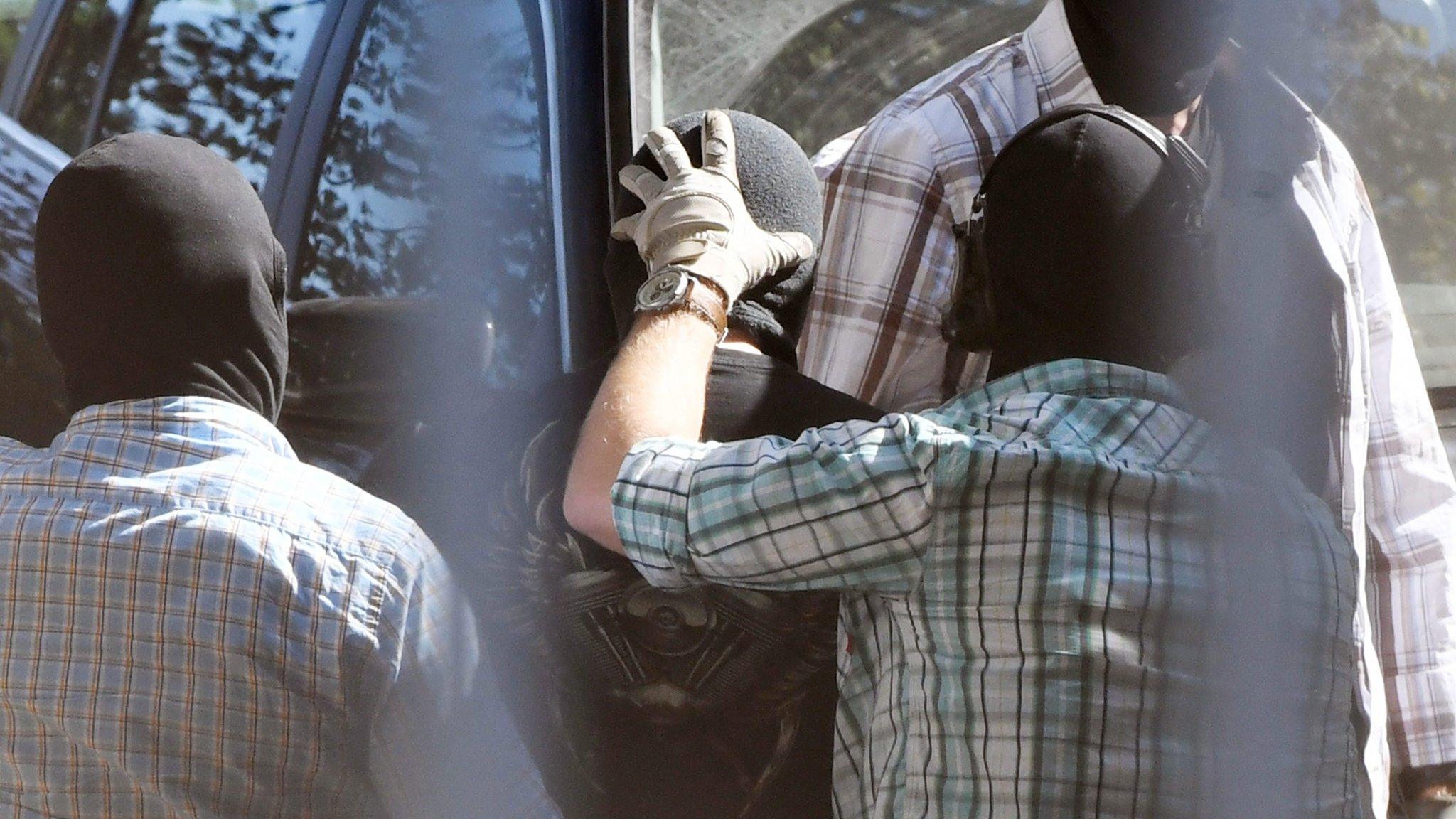Syria conflict: Life returns to Jarablus after IS flees
- Published
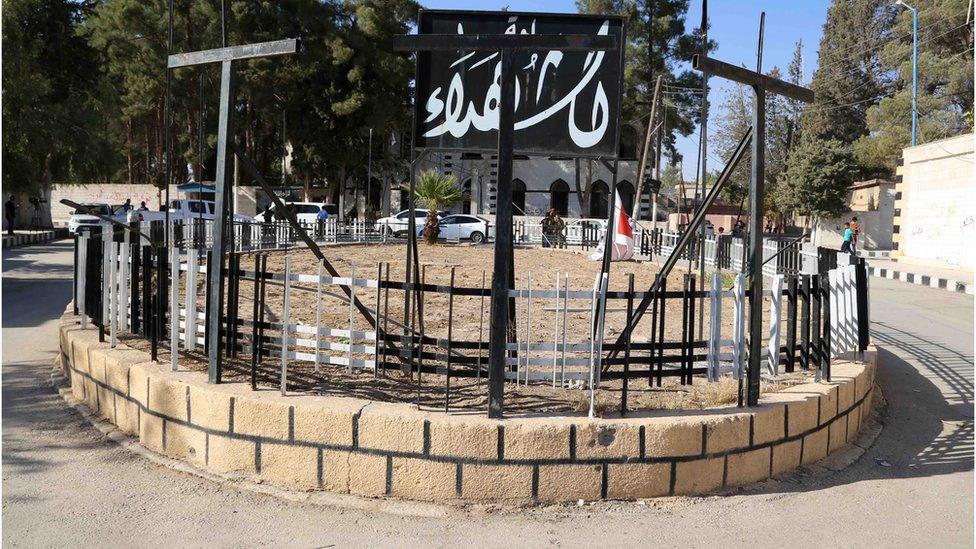
IS executed its enemies in "Martyrs' Square" in the heart of Jarablus
They stand on the central roundabout in Jarablus, exposed to the whole town: three iron posts where enemies were executed.
Bodies, or body parts, were nailed to them, beside a black billboard reading "Martyrs' Square". This is where so-called Islamic State (IS) meted out its justice.
It is just one of the vestiges of brutality during the jihadists' control. We were allowed in by the Turkish authorities to see Jarablus, recently liberated by rebel soldiers from the Free Syrian Army (FSA), backed by the Turkish military.
Mark Lowen reports from the Syrian border town of Jarablus
It was recaptured within a day; IS appeared to have largely withdrawn before the troops arrived.
On the short drive across the border from Turkey, the impact of war is clear: some buildings lie in rubble, destroyed by airstrikes or heavy fighting.
Occasional flags of the Syrian opposition flutter on the dusty roadside. But it's in the centre of Jarablus that the shadow of the Islamic State group is everywhere: walls painted with the notorious black flag and jihadist graffiti mark what was their border stronghold for almost three years.
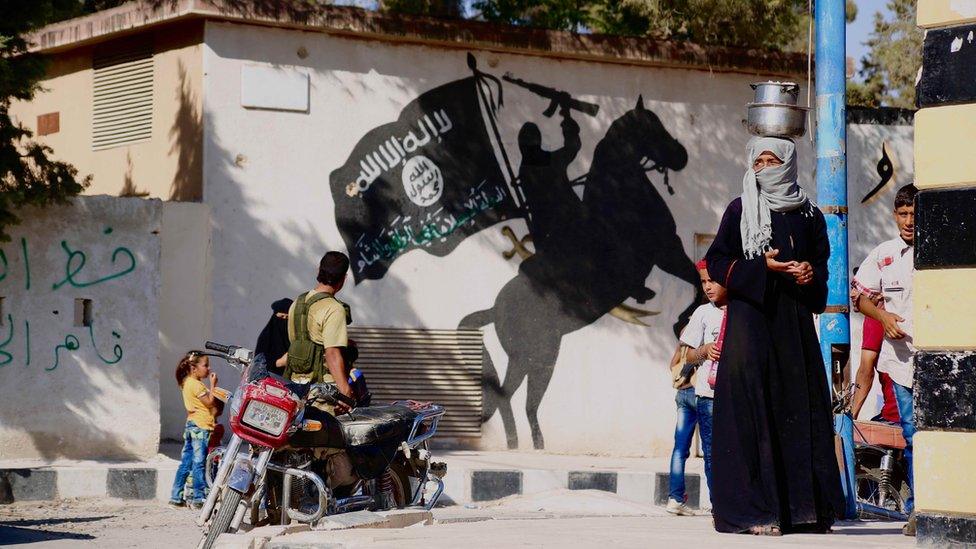
Walls in Jarablus are painted with the notorious black flag and jihadist graffiti
Just off the main roundabout we meet Aysha al-Amin.
From her house she can almost see the execution posts where the head of her son Odal was planted. He had joined the Free Syrian Army and was captured by IS.
They ambushed him, beheaded him and, in case she hadn't seen their spoils, took his head to her front door.
"It's as if we were living in a prison under them," she says. "We couldn't leave, we weren't allowed to talk to anyone. If we sat outside, they would send us indoors. They forced us to cover up. Now we are free - we're like a newborn baby."
Turkey was once seen as a reluctant part of the anti-IS coalition.
It took a year of airstrikes for Ankara to allow the US to use its Incirlik airbase in southern Turkey for raids against the jihadists.
The Turkish authorities were widely accused of lax border control with Syria, allowing foreign fighters and weapons to cross both ways. Turkey has always angrily denied the allegations, blaming foreign intelligence failures and denying accusations that it fed jihadist groups.
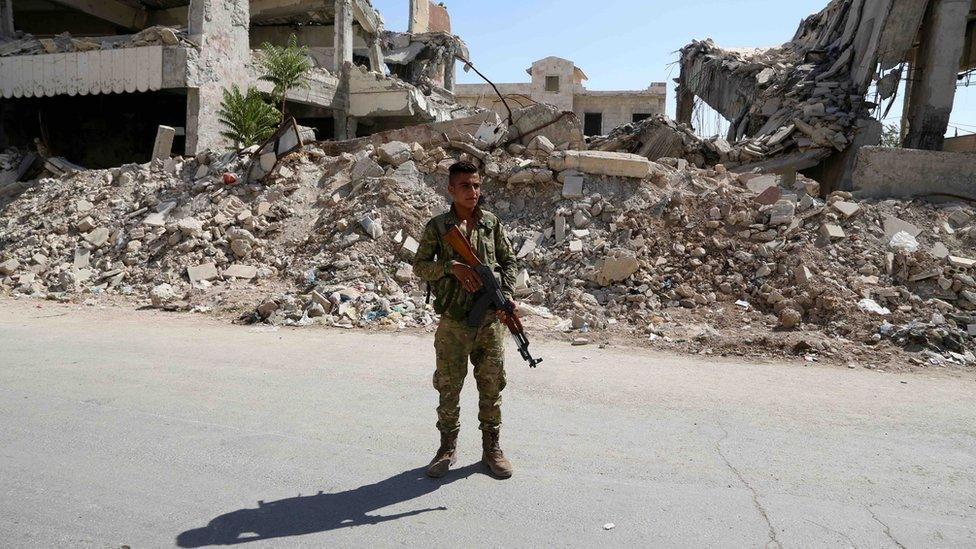
Parts of Jarablus have been left in ruins
But after a wave of IS-linked bombings within Turkey, Ankara led the operation in Jarablus.
Turkish tanks rolled across the border and its special forces trained FSA fighters for the incursion dubbed "Operation Euphrates Shield".
For Turkey the impetus was two-pronged: to oust the jihadists while also preventing Kurdish fighters from filling the vacuum.
The Turkish government sees the Kurdish PYD party in Syria and its YPG militia as terrorists. It says they are linked to the Kurdish militant PKK in Turkey which Ankara and the West labels a terrorist group. And it feared the Kurds consolidating territory on the border, potentially feeding Kurdish separatism within Turkey.
In that, Turkey had the support of the Free Syrian Army, which has also battled Kurdish fighters.
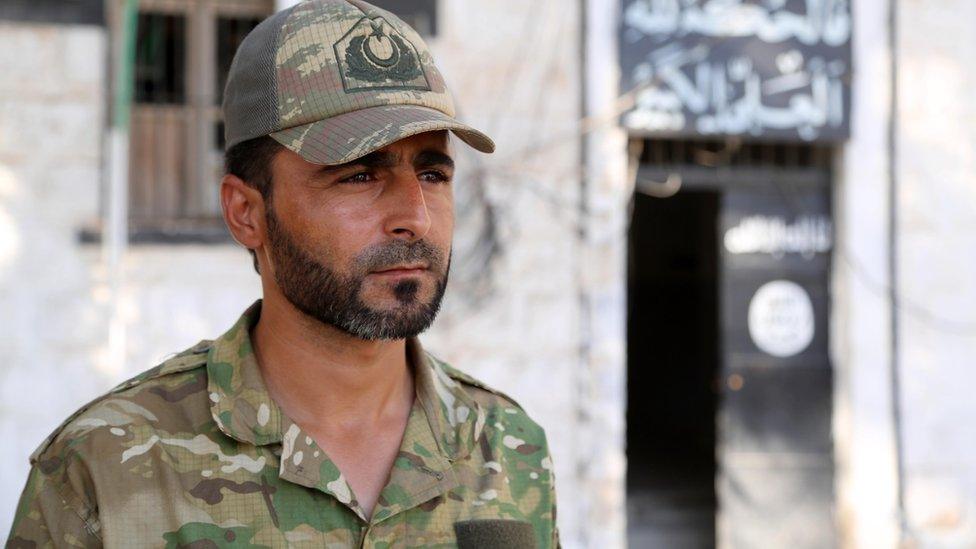
FSA commander Ahmed al-Jader said his colleagues now wanted to target the IS stronghold of Raqqa
"It was as important for us to push back the Kurdish militia as it was to oust IS," says Ahmed al-Jader, an FSA commander involved in the Jarablus operation. "They are both terrorist organisations".
His words almost parrot Turkey's line. It's no wonder the hat of his uniform bears the insignia of the Turkish army.
"With our victory in Jarablus, we feel capable and confident of beating Daesh [IS] in other areas." He tells me their sights are now set on the capital of IS's self-styled caliphate. "We'll go towards Raqqa and liberate all Syrian land".
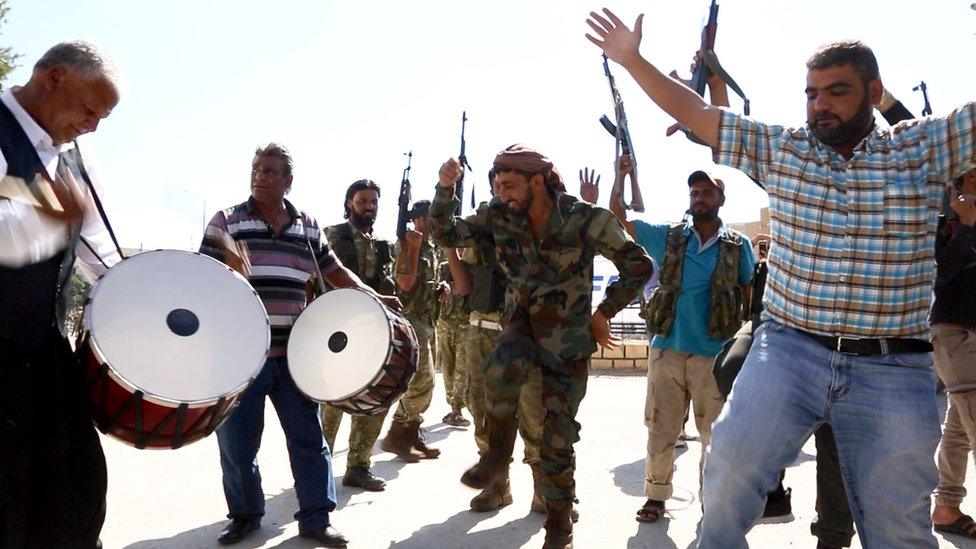
Locals and FSA fighters celebrate life without so-called Islamic State
Suddenly a group of musicians arrives in the centre of Jarablus, playing drums and folk clarinets.
FSA fighters and some locals start to dance. It is an extraordinary scene: a month ago, they would have been killed for doing it.
But life is returning to Jarablus. Twenty thousand refugees have come back from Turkey, which is reconnecting electricity.
"I thought my children would never see Jarablus," says Abu Mohamed. "My son used to cry, saying 'I want to go home'. Thank God we have come back."
We talk in the courtyard of his home, beside his three young children. "When IS came, we fled. You were either with them - or you wouldn't live."
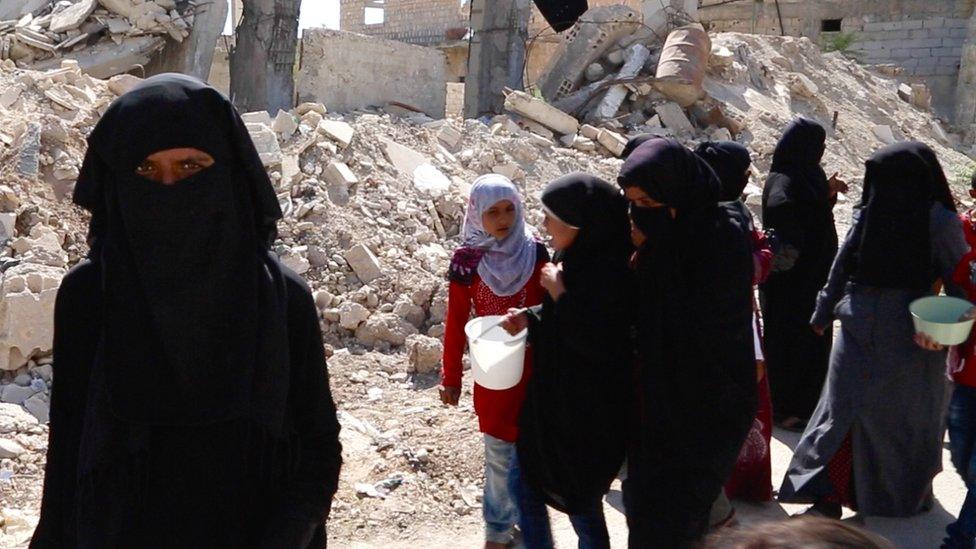
Many women in Jarablus have remained covered up in case IS militants remain in the city
After 90 minutes in Jarablus, we were instructed by the Turkish authorities to leave for safety reasons.
There is still nervousness here, with groups of FSA soldiers checking identity cards in case of possible sleeper cells.
When the nearby town of Manbij was liberated from IS last month, there were iconic images of women burning their burkas. But in Jarablus, many of the women we saw were still fully covered amidst fears that stray IS militants still remain.
If the ceasefire deal between the opposition and regime holds, the US and Russia have pledged to coordinate airstrikes against IS.
Turkey is now fully engaged, appearing to mark its influence in northern Syria with the Jarablus incursion and pledging to push on to other IS strongholds.
It could still be too early to talk of a turning point against the jihadists - IS has repeatedly proven its resilience in the past.
But momentum is building and the group appears to be on the back foot. The coalition's desire to "degrade and ultimately destroy" the jihadist group no longer seems an unattainable goal.

- Published13 September 2016
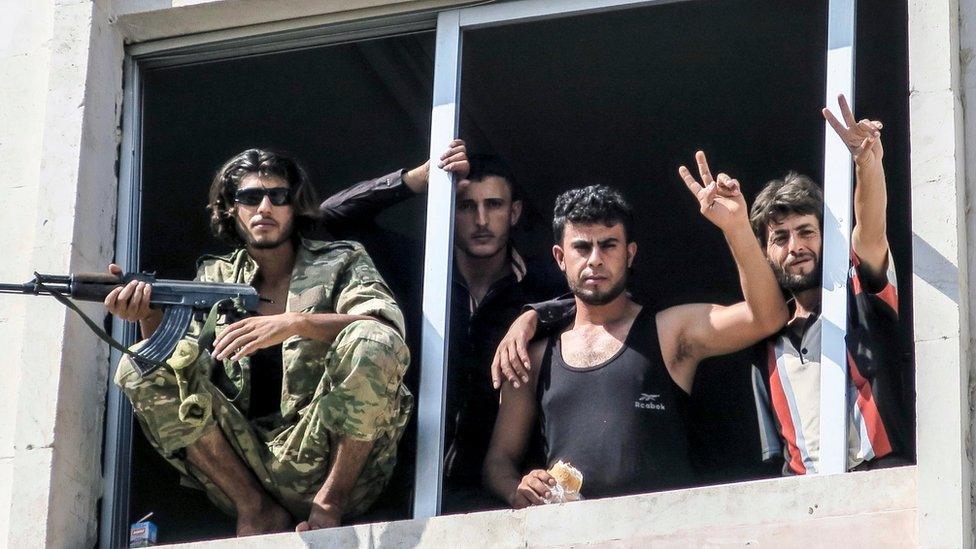
- Published13 September 2016
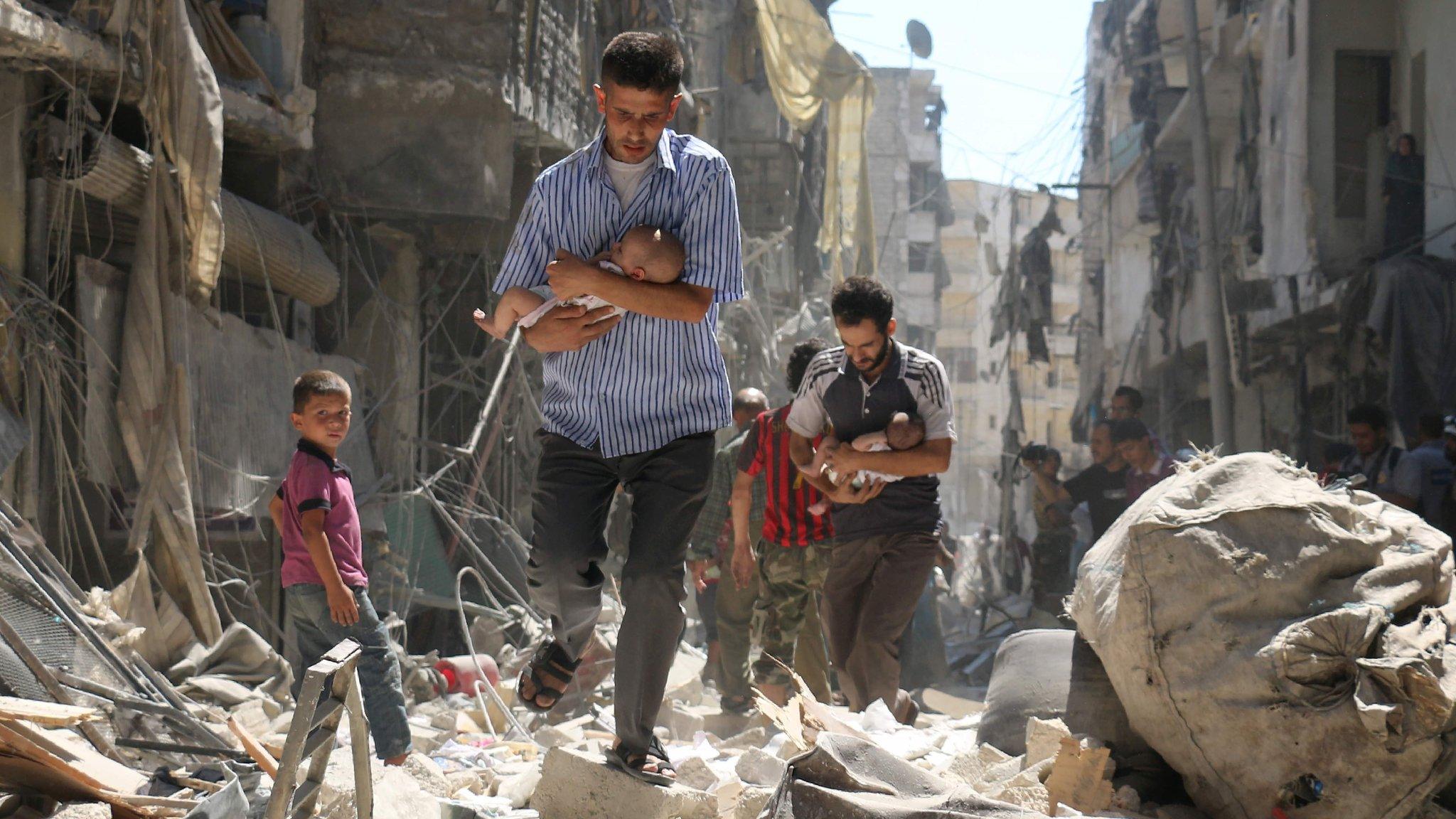
- Published12 September 2016
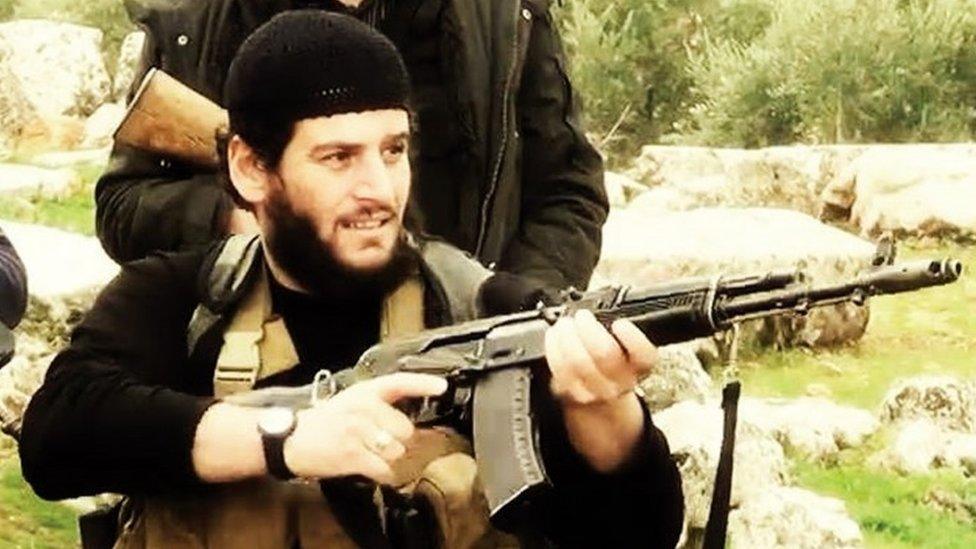
- Published13 September 2016
